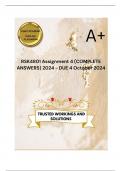, Since 2020, many incidents and events have caused
organisations to adopt a focused approach towards risk
management and the role of risk managers. Examples of these
events are the COVID-19 pandemic and its severe effects on
many countries, economies, and businesses. South Africa was
not excluded from the pandemic and was further hampered by
severe power interruptions and inadequate service delivery.
These are all risk-related incidents/events involving risk
managers to assist in the management thereof. According to an
article in Enterprise Risk Magazine (2023), uncertainty also
boosted the profile and role of risk managers. Large-scale risks
are happening more often, which requires sound risk
management to cope with the increasingly unclear business and
physical environments. As such, it seems imperative that the
role of risk managers and appropriate risk management tools is
clear. The classic three lines of defence in the risk governance
model endeavour to demarcate the various roles regarding the
management of risks. Although there are many issues
surrounding this model, it provides a foundational guideline for
the roles of the main role-players in risk management.
Regarding the tools for operational risk management, it seems
that there are concerns over the predictive powers of key risk
indicators (KRIs), the value of risk and control self-assessments
(RCSAs), and the subjectivity of scenario analysis to manage
operational risks (Enterprise Risk Magazine, 2023). In addition,
embedding an operational risk management framework is
becoming essential. However, it appears that there is only a




